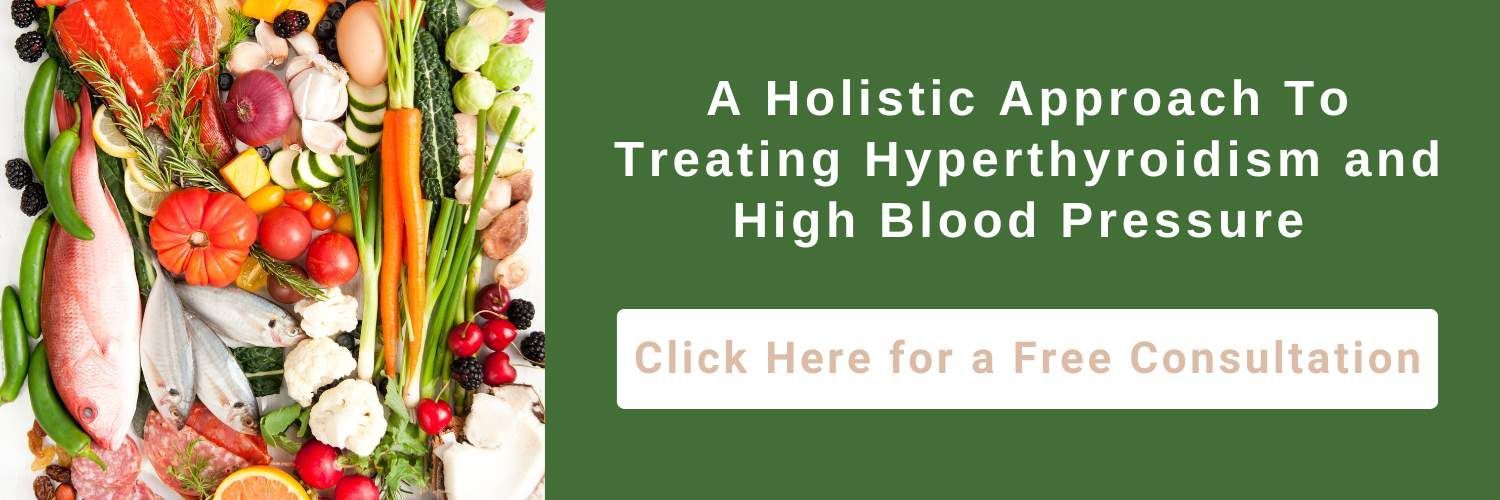Does Hyperthyroidism Cause High Blood Pressure? The Potential Link Between Thyroid Function and Heart Health
"The content below is not intended to be a substitute for professional medical advice, diagnosis, or treatment. Always seek the advice of your physician or other qualified health provider with any questions you may have regarding a medical condition."
High blood pressure? Low thyroid stimulating hormone levels? Last week, you thought you were perfectly healthy. What does this all even mean?
Hyperthyroidism and high blood pressure can often co-occur, and there may be links between the two. The good news is that there are potential treatments for both conditions that may be simpler than you think. Many are linked to lifestyle changes and overall healthy habits.
We will explore in depth what research shows about the link between thyroid function, heart health, and blood pressure. Most importantly, we will explore what you can do about it if your doctor has indicated or you suspect that you may have a problem.
Table of Contents
Can Hyperthyroidism Cause High Blood Pressure?
It can and does, but it’s not common. About 10% of high blood pressure (hypertension) cases are secondary hypertension, which means the elevated blood pressure is secondary to or caused by another identifiable cause. Of these 10% of hypertension cases, endocrine disorders (including hyperthyroidism) are a cause of some.
Even within the category of endocrine disorders leading to secondary hypertension, primary aldosteronism is considered to be the cause of most cases. According to the study linked above, it is rare that thyroid diseases cause secondary hypertension.
This does not mean that the conditions cannot and do not co-occur, but it is unknown whether hyperthyroidism is the root cause of hypertension in many cases. Truthfully, deeper research into the specific links and connections between the two conditions needs to be conducted. Some researchers have found that other lifestyle and nutrition factors can drastically improve hypertension levels.
Dr. Sergi at HealthierU provides an in-depth consultation where she’ll discuss holistic options for treating hyperthyroidism. Contact us today for help.
Why Does Hyperthyroidism Cause High Blood Pressure?
Hyperthyroidism can cause high blood pressure for several reasons. Two potential reasons have been recently studied:
- Genetic mutations in the hypothalamus-pituitary-thyroid axis can lead to cardiovascular consequences.
- Atherosclerotic changes resulting from lipid abnormalities due to thyroid dysfunction can affect the vasculature and cause elevated blood pressure.
Unfortunately, many past clinical studies have been controversial or inconclusive.
This study dives deeper into the specific causes and connections between thyroid disorders, including hyperthyroidism, and hypertension.
How Thyroid Hormones Affect Blood Pressure
Hyperthyroidism occurs when the body produces too much thyroid hormone and is also commonly referred to as ‘overactive thyroid’. It commonly presents as the heartbeat speeding up, beating irregularly, or causing heart palpitations. Increased cardiac output and strain can cause an increase in blood pressure.
The thyroid hormone T3 (triiodothyronine) is elevated in cases of hyperthyroidism, and this can cause dilated resistance arterioles. These dilated arterioles may cause the constriction of blood vessels, limiting blood flow and further contributing to increased blood pressure.
Hypothyroidism — an underactive thyroid — can also
increase the risk of hypertension by slowing the heart rate, stiffening blood vessels, and potentially increasing cholesterol levels, leading to narrowed and hardened arteries.
How Does Hyperthyroidism Cause High Blood Pressure?
Increased thyroid hormones in your bloodstream can cause many symptoms some of which might impact blood pressure:
- Elevated amounts of blood pumped each minute (cardiac output)
- Increase in the stiffness of arteries, reducing their ability to expand
These two symptoms combined may lead to more blood being pumped through a smaller space, which can raise blood pressure. Additionally, many of the lifestyle and nutrition factors that can negatively affect thyroid health can also lead to high blood pressure.
There is some disagreement in past scientific studies about whether thyroid conditions do frequently cause hypertension or whether the conditions co-occur for other reasons.
Speaking with a holistic nutrition practitioner, like HealthierU in Brooklyn, can provide insight into what you can do to improve both hyperthyroidism and high blood pressure naturally. Give us a chance to help you get to the bottom of
why hyperthyroidism can cause high blood pressure and what you can do about it.
Symptoms of Hypertension Caused By Hyperthyroidism
Symptoms of hypertension and hyperthyroidism may not always be apparent. Many people develop asymptomatic hypertension and hyperthyroidism. It’s a good idea to get consistent screening for hypertension if you have been diagnosed with either subclinical or overt hyperthyroidism.
We also recommend testing your thyroid when you observe any combination of the following symptoms:
- Increased or irregular heart rate
- High systolic and low diastolic blood pressure
- Increased appetite
- Weight loss
- Feeling jittery, anxious, or on edge
- Feeling hot
- Excessive sweating
- Stomach issues, including diarrhea
- Fatigue and difficulty sleeping
- Shaking hands
Your doctor may suspect that you have secondary high blood pressure if you don’t have risk factors such as obesity or inactivity, and you also have typical symptoms of hyperthyroidism such as a fast heart rate or persistent fatigue. High blood pressure may be the initial sign for many types of endocrine system imbalances, including hyperthyroidism and hypothyroidism.
Managing Blood Pressure with Hyperthyroidism
Testing
If your doctor suspects that you may have a thyroid imbalance, they will likely order a panel of blood tests, including for T3, T4, thyroid stimulating hormone (TSH) levels, and thyroid antibodies.
Doctors may order the TSH test first and then order the T3 and T4 tests if TSH levels come back low. Or, they may order all three tests at once if there are many indications of overt hyperthyroidism.
Research indicates that the assessment of TSH is an incredibly useful test that can provide valuable insight into thyroid function for many patients. Luckily, most insurance plans typically cover these tests.
Treatment Options for Hypertension in Hyperthyroidism
Treatment of high blood pressure due to hyperthyroidism often involves correcting the underlying thyroid issue. Depending on the severity of
hypertension and hyperthyroidism, options for treatment include natural, holistic lifestyle changes, medication, and/or surgery.
Medication
Two types of interventions are commonly prescribed for hyperthyroidism:
- Thioamides – Help stop the thyroid from producing excess hormones
- Radioactive iodine therapy – destroys cells that produce thyroid hormone
Surgery
In some cases, your doctor may recommend surgery to remove all or part of your thyroid gland. Before deciding to get surgery for your thyroid, you may want to get a second opinion from a holistic health practitioner about whether other treatment options might be effective or if surgery should be the go-to treatment option.
Natural Lifestyle Changes
Depending on the severity of your thyroid dysregulation and hypertension, natural lifestyle changes can improve both.
Contact our holistic nutritionist at HealthierU today to get a better understanding of your unique situation and learn whether nutrition and lifestyle changes can help your thyroid function and hypertension.
6 Lifestyle Changes to Get Your Thyroid and Blood Pressure Under Control
#1: Eat a Heart-Healthy Diet
Eat a balanced, nutritious diet that prioritizes whole foods. This is key to improving overall health, regulating thyroid hormone levels, and lowering blood pressure levels. Speak with a holistic nutritionist today at HealthierU to learn what foods may lead to substantial improvements in your overall health, in particular as they relate to thyroid dysregulation and hypertension.
Here are some whole foods that you should consider incorporating into your diet if you have thyroid issues:
- Seaweed
- Fish
- Eggs
- Brazil nuts
- Leafy greens
- Berries
- Beef and lamb
#2: Exercise Regularly
Getting regular moderate to intense exercise is important for heart health. The American Heart Association recommends that you get at least 150 minutes per week of moderate-intensity aerobic activity or 75 minutes per week of vigorous aerobic activity.
You can try any of the following forms of exercise to get these AHA recommended times in:
- Yoga
- Walking
- Running
- Swimming
- Weight lifting
- Group exercise classes
- Pilates
- Biking
#3: Quit or Avoid Smoking
Smoking exacerbates high blood pressure and can negatively impact thyroid function, potentially increasing the risk of Graves' hyperthyroidism.
If you are already diagnosed with hyperthyroidism and/or hypertension and undergoing treatment, smoking may render the treatment less effective. We recommend quitting smoking if it is a habit you currently have.
#4: Manage Stress Levels
High stress levels can exacerbate thyroid level imbalances and high blood pressure. Chronic stress, in particular, is dangerous.
Try to find ways to manage your stress levels, such as:
- Meditation
- Therapy
- Journaling
- Investing time in hobbies
- Movement
- Sunlight
- Fresh air
#5: Improve Sleep
Getting enough sleep and getting quality sleep is good for health in so many ways.
Try the following tips to improve your sleep:
- Sleep in a dark room
- Do not use electronic devices for at least one hour before bedtime
- Develop a bedtime routine
- Stick to a regular sleep schedule
- Get exercise every day, but not too close to bedtime
#6: Take Supplements
Natriuretic peptides are hormones secreted by the heart that play a crucial role in regulating blood volume, blood pressure, and sodium and water balance.
Supplements do not exist that add natriuretic peptides to your diet, but the following nutrients can influence natriuretic peptide levels and improve heart health:
- Omega-3 fatty acids
- Vitamin D
- Melatonin
Speak with a holistic health care practitioner today to learn what supplements can help restore thyroid health and lower blood pressure.
Naturally Restore Your Thyroid Function and Blood Pressure with HealthierU
Your thyroid function is out of whack and you need help, but you want to avoid endless medications and therapies.
Learning to implement natural lifestyle changes into your daily routines can help restore your thyroid function and improve your blood pressure so you can feel better while having control of your thyroid symptoms.
Dr. Sergi at HealthierU will walk you through testing, natural treatment options, lifestyle shifts, diet changes, and supplement additions that can change your health for the better when it comes to hyperthyroidism and high blood pressure. By combining her backgrounds in holistic nutrition and chiropractic care, Dr. Sergi is uniquely qualified to dive deep into what’s going on with you.
Natural
hyperthyroidism treatment in Brooklyn can provide the solutions you seek. Contact us today to get started.






